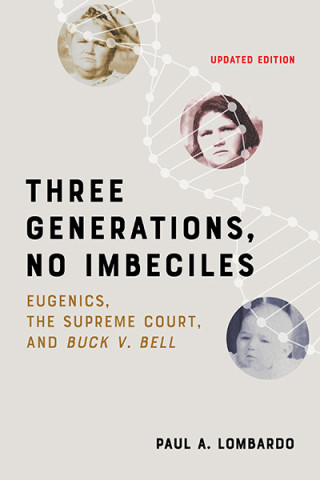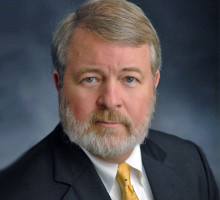
Johns Hopkins UniversityEst. 1876
America’s First Research University
Just Lucky

By Paul A. Lombardo
I began my book Three Generations, No Imbeciles: Eugenics, the Supreme Court and Buck v. Bell, with an account of my introduction to the Buck case in 1980, when I saw a newspaper story about a lawsuit brought by someone who had been sterilized. It wasn’t just any someone, it was Doris Buck, Carrie Buck’s sister. I think of this incident regularly when I am doing historical research and am reminded how much chance shapes the directions our studies and our lives take.
Finding the archived papers of the lawyer who wrote the Virginia law challenged in Buck was the first discovery I made. Without it, I would likely never have been able to focus my curiosity on eugenics and would probably never have pursued things like Carrie Buck’s school grades, those of her daughter Vivian, or pictures of both of them I found decades later. Everything that followed and everything I wrote about in this book was triggered by that first chance discovery as a graduate student.
This is how it happened: I was having a late breakfast in a small cafe, wondering what I would write a seminar paper about, when I noticed that someone had left that day’s local newspaper in the booth where I was sitting. One headline caught my eye: “I wanted babies bad.” A picture of Doris Buck illustrated the article. The name meant little to me at the time, but the article explained that she was the sister of Carrie Buck, whose 1927 case at the U.S. Supreme Court validated state laws authorizing coercive sterilization in state institutions. Like Carrie, Doris had also been sterilized by state doctors in Virginia.
I grabbed the paper, walked across the street to the University of Virginia campus, and before too long found myself in the university library. Back then—before computerization of the library catalogue-- all the books and journals were listed on paper cards kept in a row after row of alphabetical cabinets. I began what I thought would be a long slog through those files.
Starting with a copy of the Buck Supreme Court opinion, I noted the names of people it mentioned. Oliver Wendell Holmes, Jr. was first, but it took only a minute to see that there were dozens of books about him in the library. Beginning research with Holmes, one of the most famous judges in Supreme Court history might be more than my seminar paper timeline could bear. I turned instead to Aubrey Strode, the lawyer for the state hospital where Buck’s surgery occurred. To my amazement, there were several cards that described the Strode Collection in the library archives.

Before long, I made my way to the basement room where the special collections were stored. It was a dark and somewhat dreary place, where researchers filled out request cards and waited for boxes of documents to arrive. Strode had been a lawyer for many years, then an elected legislator, then a judge. He attended Virginia both as an undergraduate and a law student, and when he died, all his records were donated to his alma mater. According to the collection inventory, Strode left material that filled more than 170 boxes of material and a dozen or more ledgers. I filled out a slip requesting the three boxes numbered 1, 100, and 170.
After a bit of a delay, an archivist came back to me. “What exactly are you looking for?” she said. I really didn’t know, but I said I wanted to survey the range of material they had. She looked a bit puzzled and told me there were no numbers on the boxes. We went back into the inner sanctum where the records were stored, and I saw that all those boxes took up yards of shelf space but had never been used before. I put the first and last boxes on a cart and took them back to my desk. Over the following months, I eventually put numbers on all those boxes.
Judge Strode was something of a packrat. He kept everything from his restaurant receipts to his laundry slips, train schedules and used tickets, notes written on the back of envelopes, and scraps of paper that contained the text of his first public speech. He also had bills for his first typewriter and the first telephone in his law office, as well as more than fifty years of correspondence, starting with “wet letter” copies of handwritten work that were the norm early in his younger years.
With all that material, I was able to finish my seminar paper. I went on to write a biography of Strode that traced his life from birth to death, focused on his role as the lawyer who helped found the Virginia Colony for Epileptics and Feebleminded and wrote much of the law that affected it. He represented the Colony in the Supreme Court, defending the law that authorized eugenic sterilization of “socially inadequate” patients.
My dissertation was titled: Eugenical Sterilization in Virginia: Aubrey Strode and the Case of Buck v. Bell. Had I not stumbled upon that news story over breakfast, I doubt I would have written it. Working hard is important, but without luck, sometimes you never get started.




